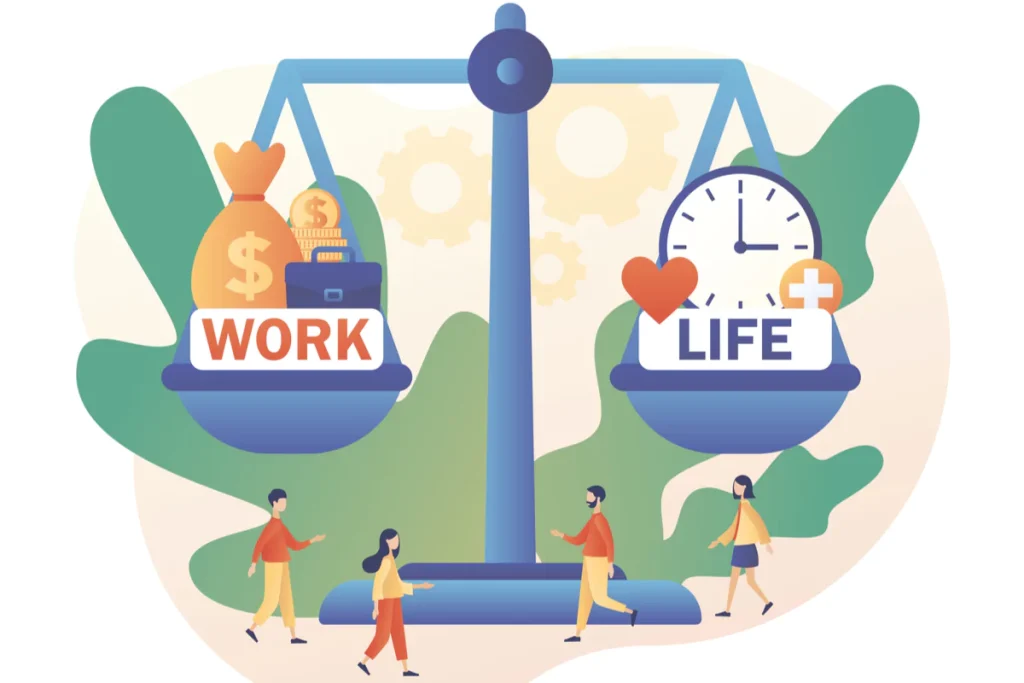
Tips for Maintaining a Healthy Lifestyle in Today’s World
In our fast-paced modern world, maintaining a healthy lifestyle can be challenging. With the pressures of work, social obligations, and personal responsibilities, it’s easy to neglect our well-being. However, prioritizing health is crucial for a balanced and fulfilling life. This comprehensive guide provides practical tips for achieving and maintaining a healthy lifestyle, taking into account today’s social environment, quality of life, mental condition, and life pressure.
1. Understanding a Healthy Lifestyle
A healthy lifestyle encompasses physical, mental, and emotional well-being. It involves making conscious choices that promote overall health and happiness. Key components include a balanced diet, regular exercise, sufficient sleep, stress management, and strong social connections.
1.1 The Importance of a Balanced Diet

A balanced diet provides the necessary nutrients for our bodies to function correctly. It includes a variety of foods from all food groups: fruits, vegetables, lean proteins, whole grains, and healthy fats. Proper nutrition helps maintain a healthy weight, reduces the risk of chronic diseases, and supports overall well-being.
Tips for a Balanced Diet:
Eat a Rainbow: Incorporate a variety of colorful fruits and vegetables to ensure you get a range of nutrients.
Whole Grains: Choose whole grains over refined grains to increase fiber intake and maintain digestive health.
Lean Proteins: Opt for lean proteins such as chicken, fish, beans, and legumes.
Healthy Fats: Include sources of healthy fats like avocados, nuts, seeds, and olive oil.
Moderation: Practice portion control and moderation, especially with high-calorie and high-sugar foods.
1.2 The Role of Regular Exercise

Regular physical activity is essential for maintaining a healthy body and mind. Exercise helps control weight, strengthens muscles and bones, improves cardiovascular health, and enhances mood.
Types of Exercise:
Aerobic Exercise: Activities like walking, running, cycling, and swimming that increase heart rate and improve cardiovascular health.
Strength Training: Exercises such as weight lifting and resistance training that build muscle mass and strength.
Flexibility and Balance: Practices like yoga and Pilates that enhance flexibility, balance, and mental relaxation.
Tips for Incorporating Exercise:
Set Realistic Goals: Start with achievable goals and gradually increase the intensity and duration of your workouts.
Find Activities You Enjoy: Choose exercises that you find enjoyable to stay motivated.
Consistency is Key: Aim for at least 150 minutes of moderate aerobic activity or 75 minutes of vigorous activity each week, combined with muscle-strengthening exercises twice a week.
Stay Active Throughout the Day: Incorporate physical activity into your daily routine, such as taking the stairs, walking during breaks, or biking to work.
1.3 The Importance of Sufficient Sleep
Adequate sleep is vital for physical and mental health. It allows the body to repair itself and the brain to consolidate memories and process information. Lack of sleep can lead to various health issues, including weakened immunity, weight gain, and impaired cognitive function.
Tips for Better Sleep:
Maintain a Sleep Schedule: Go to bed and wake up at the same time every day, even on weekends.
Create a Restful Environment: Keep your bedroom dark, quiet, and cool. Invest in a comfortable mattress and pillows.
Limit Screen Time: Avoid screens for at least an hour before bedtime to reduce exposure to blue light, which can disrupt sleep.
Relaxation Techniques: Practice relaxation techniques such as deep breathing, meditation, or reading a book before bed.
Avoid Stimulants: Limit caffeine and alcohol intake, especially in the hours leading up to bedtime.
2. Managing Mental Health and Stress

Mental health is a critical component of overall well-being. Chronic stress and mental health issues can significantly impact physical health, relationships, and quality of life.
2.1 Recognizing the Signs of Stress
Stress is a natural response to challenging situations, but chronic stress can have detrimental effects on health. Recognizing the signs of stress is the first step in managing it effectively.
Common Signs of Stress:
Physical: Headaches, muscle tension, fatigue, and sleep disturbances.
Emotional: Anxiety, irritability, depression, and mood swings.
Behavioral: Changes in appetite, withdrawal from social activities, and difficulty concentrating.
2.2 Practical Stress Management Techniques
Effective stress management involves a combination of lifestyle changes and coping strategies. Here are some practical techniques to reduce stress:
Techniques:
Mindfulness Meditation: Practice mindfulness to stay present and reduce anxiety. Apps like Headspace and Calm can guide you through meditation exercises.
Deep Breathing: Deep breathing exercises can help calm the mind and reduce physical tension.
Physical Activity: Regular exercise releases endorphins, which are natural stress relievers.
Time Management: Prioritize tasks and break them into manageable steps to avoid feeling overwhelmed.
Social Support: Connect with friends, family, or support groups to share your feelings and gain perspective.
2.3 Seeking Professional Help
If stress becomes unmanageable or if you experience persistent mental health issues, seeking professional help is crucial. Therapists, counselors, and psychiatrists can provide support and treatment tailored to your needs.
When to Seek Help:
Persistent feelings of sadness, anxiety, or hopelessness.
Difficulty functioning in daily life.
Thoughts of self-harm or suicide.
Using substances to cope with stress.
3. Building and Maintaining Social Connections

Strong social connections are essential for mental and emotional well-being. Positive relationships provide support, reduce stress, and increase feelings of happiness and belonging.
3.1 The Benefits of Social Connections
Social interactions can improve mood, enhance self-esteem, and provide a sense of purpose. They can also buffer against stress and promote healthier behaviors.
Tips for Building Social Connections:
Join Groups or Clubs: Participate in community activities, sports teams, or hobby groups to meet like-minded individuals.
Volunteer: Volunteering can provide a sense of fulfillment and opportunities to connect with others.
Stay Connected: Use technology to keep in touch with family and friends, especially if you live far away.
Be Open: Be open to forming new relationships and nurturing existing ones.
4. Balancing Work and Life

Work-life balance is crucial for overall health and well-being. Overworking can lead to burnout, stress, and health issues, while a balanced life promotes happiness and productivity.
4.1 Setting Boundaries
Setting boundaries between work and personal life is essential to prevent burnout and maintain a healthy balance.
Tips for Setting Boundaries:
Set Work Hours: Establish clear work hours and stick to them. Avoid checking emails or working outside these hours.
Create a Dedicated Workspace: If working from home, designate a specific area for work to separate it from your living space.
Prioritize Tasks: Focus on the most important tasks and delegate or postpone less critical ones.
Take Breaks: Regular breaks throughout the day can improve productivity and reduce stress.
4.2 Prioritizing Self-Care
Self-care involves activities that promote physical, mental, and emotional health. Prioritizing self-care can help you recharge and manage stress effectively.
Self-Care Activities:
Physical Activity: Exercise regularly to boost mood and energy levels.
Relaxation Techniques: Practice relaxation techniques such as meditation, yoga, or deep breathing.
Hobbies: Engage in hobbies and activities that you enjoy.
Healthy Eating: Maintain a balanced diet to support overall health.
Sleep: Ensure you get enough restful sleep each night.
5. Adapting to Today’s Social Environment
Today’s social environment presents unique challenges and opportunities for maintaining a healthy lifestyle. Adapting to these changes is essential for overall well-being.
5.1 Navigating Technology and Social Media
While technology and social media can enhance connectivity, they can also contribute to stress and anxiety. Finding a balance is key.
Tips for Healthy Technology Use:
Limit Screen Time: Set limits on screen time, especially before bed.
Be Mindful of Social Media: Use social media mindfully and avoid comparing yourself to others.
Digital Detox: Take regular breaks from technology to focus on real-life interactions.
5.2 Coping with Life Pressures
Life pressures, such as financial concerns, work demands, and personal responsibilities, can impact health. Developing coping strategies is essential for managing these pressures.
Coping Strategies:
Financial Planning: Create a budget and savings plan to manage financial stress.
Time Management: Prioritize tasks and delegate when possible to manage work demands.
Seek Support: Reach out to friends, family, or professionals for support when needed.
6. Enhancing Quality of Life
Improving your quality of life involves making choices that promote happiness, fulfillment, and well-being.
6.1 Pursuing Personal Growth
Personal growth involves setting and achieving goals that align with your values and interests. It can lead to increased self-esteem and life satisfaction.
Tips for Personal Growth:
Set Goals: Identify short-term and long-term goals and create a plan to achieve them.
Learn Continuously: Engage in lifelong learning through courses, reading, or new experiences.
Reflect: Regularly reflect on your progress and make adjustments as needed.
6.2 Cultivating Gratitude
Practicing gratitude can enhance well-being by shifting focus from negative to positive aspects of life.
Tips for Practicing Gratitude:
Gratitude Journaling: Write down things you are grateful for each day.
Express Appreciation: Share your appreciation with others.
Mindfulness: Practice mindfulness to appreciate the present moment.
Conclusion
Maintaining a healthy lifestyle is a continuous journey that involves making mindful choices to support physical, mental, and emotional well-being. By following the tips outlined in this guide, you can achieve a balanced and fulfilling life, even amidst today’s social environment and life pressures. Prioritize your health, seek support when needed, and embrace a holistic approach to well-being for a happier, healthier you.


